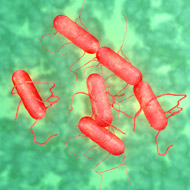Scientists engineer self-destructing bacteria to kill cancer cells

Hasty and his team synchronised the bacteria to release bursts of known cancer drugs when a bacterial colony self-destructs within the tumour.
Scientists at the University of California and the Massachusetts Institute have discovered a therapeutic approach to cancer that minimises damage to surrounding cells.
A study published in the journal Nature describes how researchers engineered self-destructing bacteria that release anti-cancer drugs within tumours.
“In synthetic biology, one goal of therapeutics is to target disease sites and minimise damage,” said lead author Jeff Hasty, professor of bioengineering and biology at UC San Diego.
In the study, Hasty and his team synchronised the bacteria to release bursts of known cancer drugs when a bacterial colony self-destructs within the tumour.
Researchers say the use of bacteria to deliver cancer drugs in vivo is 'enticing' because conventional chemotherapy doesn't always reach the inner regions of a tumour.
Importantly, the researchers observed the combination of chemotherapy and the gene products produced by the bacterial circuit consistently reduced tumour size.
“The new work by Jeff Hasty and team is a brilliant demonstration of how theory in synthetic biology can lead to clinically meaningful advances,” said Jim Collins, a founder of the field of synthetic biology.
“Over a decade ago during the early days of the field, Jeff developed a theoretical framework for synchronising cellular processes across a community of cells. Now his team has shown experimentally how one can harness such effects to create a novel, clinically viable therapeutic approach.”



 The latest
The latest